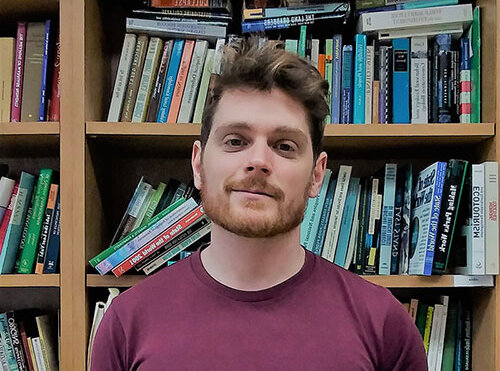Jeffrey Andrews

Postdoctoral Researcher
Max Planck Institute for Evolutionary Anthropology
Department of Human Behavior, Ecology and Culture
Deutscher Platz 6
04103 Leipzig
Phone: +49 341 3550 304
E-mail: jeffrey_andrews@[>>> Please remove the text! <<<]eva.mpg.de
Office: level 1, room u1.12
I am an applied evolutionary social scientist with a background in economics and sociology. My research focuses on understanding how institutions evolve. Institutions are the set of interlocking norms, rules, and behavioural enforcement mechanisms that govern behaviour and (sometimes) support cooperation. Beyond strict rationality both, cultural evolution and social learning help us understand how institutions emerge and stabilize throughout history. In particular, I bridge applied research in conservation and modelling cultural evolution to understand how humans build institutions for managing natural resources.
Recently I have also initiated a project focus on market integration. Our goal is to understand how markets emerge and how people who once lived subsistence lifestyles (foraging, farming, and fishing) integrate themselves into modern market institutions.
Both of these research goals are aided by a field site I help run, in conjunction with Monique Borgerhoff Mulder and Tim Caro, in Pemba, Tanzania. Pemba provides a unique opportunity to study some of the world's most pressing challenges facing modernizing societies (environmental conservation and market integration). Indeed, it offers a worthy challenge for scientists to learn how to apply our findings to support residents meet modern challenges head-on.
Publications
2024
Andrews, J. B., & Borgerhoff Mulder, M. (2024). The value of failure: The effect of an expired REDD+ conservation program on residents’ willingness for future participation. Ecological Economics, 220: 108155. |
|
Andrews, J. B., Clark, M., Hillis, V., & Borgerhoff Mulder, M. (2024). The cultural evolution of collective property rights for sustainable resource governance. Nature Sustainability, 7(4), 404-412. |
|
Clark, M., Andrews, J., Kolarik, N., Omar, M. M., & Hillis, V. (2024). Causal attribution of agricultural expansion in a small island system using approximate Bayesian computation. Land Use Policy, 137: 106992. |
|
Clark, M., Hamad, H. M., Andrews, J. B., Hillis, V., & Borgerhoff Mulder, M. (2024). Effects of perceptions of forest change and intergroup competition on community‐based conservation behaviors (advance online). Conservation Biology, e14259. |
2023
Andrews, J. B., & Marcoul, P. (2023). The long-term effects of climate shocks on social preferences: evidence from rural Tanzania. Personality and Individual Differences, 203: 112010. |
|
Redhead, D., Maliti, E., Andrews, J. B., & Borgerhoff Mulder, M. (2023). The interdependence of relational and material wealth inequality in Pemba, Zanzibar. Philosophical Transactions of the Royal Society B: Biological Sciences, 378(1883): 20220288. |
2022
Andrews, J. B., & Borgerhoff Mulder, M. (2022). Forest income and livelihoods on Pemba: A quantitative ethnography. World Development, 153: 105817. |
|
Clark, M., Andrews, J., & Hillis, V. (2022). A quantitative application of diffusion of innovations for modeling the spread of conservation behaviors. Ecological Modelling, 473: 110145. |
2021
Andrews, J. B., & Borgerhoff Mulder, M. (2021). Norm compliance in common pool resource management: Experimental evidence from Pemba. American Journal of Physical Anthropology, 174(S71), 4-4. |
|
Andrews, J. B., Caro, T., Ali, S. J., Collins, A. C., Hamadi, B. B., Khamis, H. S., Mzee, A., Ngwali, A. S., & Borgerhoff Mulder, M. (2021). Does REDD+ have a chance? Implications from Pemba, Tanzania. Oryx, 55(5), 725-731. |
2018
Andrews, J. B., & Borgerhoff Mulder, M. (2018). Cultural group selection and the design of REDD+: Insights from Pemba. Sustainability Science, 13(1), 93-107. |
2014
Davidson, D. J., Andrews, J. B., & Pauly, D. (2014). The effort factor: Evaluating the increasing marginal impact of resource extraction over time. Global Environmental Change, 25, 63-68. |
2013
Davidson, D. J., & Andrews, J. B. (2013). Not all about consumption. Science, 339(6125), 1286-1287. |
 Open Access
Open Access